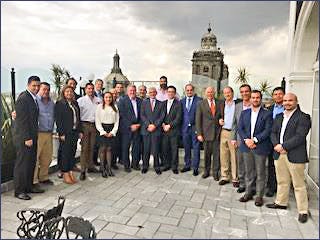In Uncertain Trade Climate, USMEF Solidifies Customer Relationships in Mexico
With retaliatory duties on U.S. pork and other potential trade barriers creating uncertainty in the Mexican market, President and CEO Dan Halstrom led a delegation of USMEF staff members through a series of meetings with importers, processors, retailers and other key buyers of U.S. red meat in Mexico City, Monterrey and Chihuahua. Halstrom was joined by Greg Hanes, vice president of international marketing and programs, and Oscar Ferrara, regional director for Mexico, Central America and the Dominican Republic. Other in-market staff participating in the meetings included Marketing Director Gerardo Rodriguez, Trade Manager Lorenzo Elizalde and Retail Manager Javier Garcia.

USMEF meets with key meat trade representatives in Mexico City to reaffirm the U.S. industry’s commitment to the Mexican market
“The main purpose of these meetings was to solidify the excellent business relationships the U.S. industry has in Mexico and to reassure these customers that the United States remains a very reliable red meat supplier,” Halstrom explained. “For example, the U.S. pork industry is both logistically and economically very well-positioned to serve the Mexican market. We tend to ship primarily fresh primals there that go directly into processing, whereas product from our European competitors arrives frozen, which increases handling costs.”
Despite these advantages, however, Halstrom emphasized that the U.S. industry must take its competition very seriously in Mexico.
“We have to be cognizant of the fact that there are competitors taking a hard look at this market, and even more so now that U.S. pork is subject to a 20 percent duty,” he said. “Mexico’s duty-free pork quota is clearly aimed at attracting new suppliers to the market, and competitors like Canadian and Chilean pork – which already have duty-free access to Mexico – now have a tariff advantage over U.S. pork for the first time. But we must take on the competition head-on, because if we do that we can not only retain the existing customer base, but also achieve further growth in Mexico.”
Although U.S. beef has not been targeted for retaliation by Mexico, Halstrom noted that proactive outreach to beef customers is especially important in this volatile trade environment.

USMEF President and CEO Dan Halstrom (center) addresses key customers in Monterrey during a weeklong series of industry meetings in Mexico
“U.S. beef still enters Mexico duty-free under NAFTA, and that’s definitely a good thing,” he said. “But there are several outstanding trade issues between the U.S. and Mexico that need to be resolved, and this generates a lot of uncertainty and concern among buyers – especially in a market that is price-sensitive. So if any additional costs are imposed on U.S. beef, we would face more intense competition not only from other beef suppliers, but from other proteins as well.”
The USMEF delegation also emphasized to customers the reports of recent progress in the NAFTA renegotiations, which suggest that the current U.S.-Mexico trade tensions could be short-term. Halstrom said many in the meat trade are hearing similar reports from Mexican negotiators, which they find very encouraging.
Ferrara noted that this series of industry meetings was also an opportunity for USMEF to remind customers of the behind-the-scenes support they receive from the U.S. industry, in areas such as client education and training, as well as regulatory assistance that helps keep shipments moving in a timely manner.
“A good example is USMEF-Mexico having full-time veterinarian, Alejandra Valdez, on staff,” Ferrara said. “With more than 60 crossing points from the U.S. into Mexico, Alejandra spends a large portion of her time working proactively to ensure that we avoid whatever the next obstacle may be that could cause U.S. meat shipments to be delayed or rejected. This is also a major focus for USMEF’s technical services team in Denver, which provides excellent support for the staff here in Mexico. These efforts play a significant role in building customer loyalty and ensuring that these buyers view USMEF as a valuable resource not only for U.S. suppliers, but for them as well.”
